Gandhi Medical College, Bhopal
Gandhi Medical College (Hindi: गांधी चिकित्सा महाविद्यालय, भोपाल, GMC) is among the oldest and most prestigious medical colleges in Madhya Pradesh and in India, at Fatehgarh, Royal Market Area, Bhopal.[1]
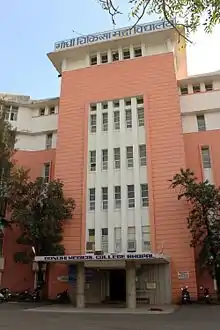 Gandhi Medical College | |
| Motto | असतो मा सद्गमय |
|---|---|
Motto in English | Lead us from Untruth to Truth |
| Type | Autonomous body (since 1997) controlled by Gandhi Medical College Society, Department of Medical Education, Government of Madhya Pradesh |
| Established | 1956 |
| Dean | Dr. Prof. T.N. Dubey |
| Students | 150 per year (undergraduate) |
| Location | , , |
| Affiliations | until 2013: Barkatullah University, from 2014: Madhya Pradesh Medical Science University |
| Website | gmcbhopal.net |
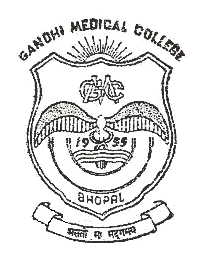 | |
The following hospitals and institutes are under the college:
- Hamidia Hospital
- Sultania Zanana Hospital
- Kamla Nehru Hospital
- Regional Institute of Ophthalmology
- National Institute For Research in Environmental Health
- Cardiac Science Center
- Medico-Legal Institute
- Trauma & emergency Center
- State Virology Laboratory
Location
GMC is in the Fatehgarh area on Sultania Road in Bhopal, Madhya Pradesh. The college stands tall on the ground where once Fatehgarh Fort stood. It is adjacent to VIP Road, which is a major tourist attraction due to the beauty and serenity of the Upper Lake. Many scenes from Bollywood movies like Rajneeti and Arakshan have been shot here. In front of the campus is one of the largest mosques in Asia, the Tajul Masjid with its Motia Talab.
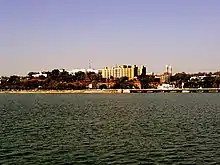
History
Gandhi Medical College, Bhopal was inaugurated on 13 August 1955 by Pt. Lal Bahadur Shastri. The college started its functioning in the building of the Polytechnic College with its first batch of 50 students and two departments: Anatomy and Physiology. The first Principal in 1955 was Dr. S.C. Sinha. The boys hostel was in the present Jehanuma Palace Hotel and the girls hostel was bracketed with the MLB college girls hostel at Banganga.
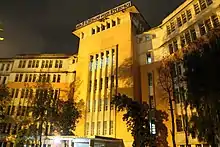
After one year the foundation of an independent building was laid by Union Minister of Home Shri Govind Ballabh Pant on 15 September 1956. It took seven years to complete the task. This beautiful piece of architecture and craftsmanship came into existence, housed in the historic Fort of Fatehgarh, to be inaugurated by the first Prime Minister of India Pt. Jawaharlal Nehru, on 13 March 1963, when a galaxy of celebrities were on the dais- Begum Sajida Sultan of Bhopal, Governor Shri H.V. Pataskar, Chief Minister Shri B.R. Mandloi, Health Minister Mr. M.P. Dubey and Principal Dr. R.P. Singh. Where the Fatehgarh Fort stood in 1722, now stands Gandhi Medical College. The former fought the enemy and the latter fights diseases.
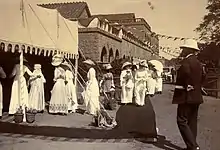
The foundation stone of the surgical and medical wards (Kamla Nehru Block known as KNB wards) was laid by Rajkumari Amrit Kaur the then Union Health Minister on 6 March 1955. Girls were shifted to the nurses hostel and later the nurses hostel had to be shifted to another building though just opposite where it stands today. Innovative Principal with new ideas that Dr. R.P. Singh was, he designed the layout of the boy's hostel on the pattern of a two tier system which was probably the first of its kind at that time. The foundation stone of this brain child of Dr. R.P. Singh was laid by King of Nepal Maharaj Mahendra Bir Vikram Shah Deo on 18 November 1955.
Hospitals for men and women were established as Prince of Wales Hospital for men and Lady Linlithgo Lansdowne Hospital for women respectively. True to the saying "old order changeth yielding place to new", the hospital changed names with change of reigns. Price of Wales Hospital became Hamidia Hospital and Lady Linlithgo became Sultania Zanana Hospital. Both are integral parts of Gandhi Medical College today. Lady Bhore Centre opposite Fire Brigade, Fatehgarh caters to antenatal and child welfare activities in addition to preventive and social medical counseling.
Campus
The campus building is housed in Fort of Fatehgarh which was inaugurated by the first Prime Minister of India Pt. Jawaharlal Nehru.[2]
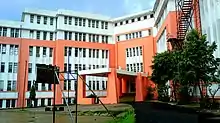
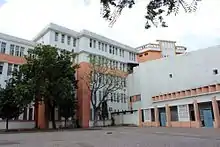
The campus houses:
- Main college building
- Hamidia hospital
- Kamla Nehru Hospital
- Regional Institute of Ophthalmology
- NIREH
- Central Pathology lab
- Blood Bank
- Rain Basera (for patients and their relatives stay)
- Two canteens: one old JDA canteen and a newly constructed one
- Hostels
- Animal House
- Guest House
- Sports ground (old)
- Lake view Cricket Ground (under construction)
- Lawn Tennis court
- Badminton court
- Basketball court
- Sports complex which houses separate gym for Boys and Girls along with a multi-activity hall and table tennis arena.
College facilities
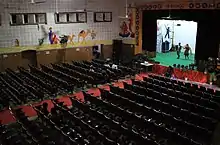
- Central Auditorium
- Four lecture theatres
- One newly reconstructed fully air-conditioned modern Lecture Theatre
- Four Examination Halls
- Boys common Room
- Girls common Room
- Lawn Tennis court
- Badminton court
- Basketball court
- Central Library
- Sports Complex
Central library
The central library is housed in the main building of the college on the underground floor. It is fully air-conditioned with all the facilities.
Facilities:
- Three halls for studying
- Central library room
- Reading room
- Annexe (Reading Room)
- Journal section
- Computer Room
Residential facilities
Residential facilities are available in the college campus for medical students, resident doctors, nurses, staff and professors.
- Hostel Block A - Senior Girls Hostel
- Hostel Block B - Senior Boys Hostel
- Hostel Block C - Senior Boys Hostel
- Hostel Block E - PG Boys Hostel
- Hostel Block F - Junior Boys Hostel (first professional year students)
- Hostel Block G - Intern Girls Hostel
- Hostel Block H - PG Girls Hostel
- Nurse Hostel
- Residence for Teachers and Professors
Hostel block H and Nurse hostel are near the Kamla Nehru Hospital, while blocks A, B, F, C, E are in the hostel area.
G Block hostel is behind the main college building.
Academics
Recognized by Medical Council of India & State Paramedical Council M.P.
- MBBS
- MS, MD, Diploma courses in different subjects
- M. Ch. in Paediatric Surgery
- M. Sc. Medical Biochemistry
- Paramedical courses in about ten departments
Affiliated to Madhya Pradesh Medical Science University, Jabalpur, Bhopal.
Departments
- Anatomy
- Physiology
- Biochemistry
- Pharmacology
- Pathology
- Microbiology
- Forensic Medicine
- Community Medicine
- Ophthalmology
- Otolaryngology (ENT)
- Anesthesiology
- Surgery
- Medicine
- Pediatrics
- Obstetrics & Gynaecology
- Orthopedics
- Radiology
- Gastroenterology
- Skin V D
- TB Chest
- Cardiology
- Pediatric Surgery
- Cardiothoracic Surgery
- Burn & Plastic Surgery
- Psychiatry
- Dentistry
- Oncology
Administration
- Dean - Dr. Prof. T.N. Dubey (D.M. Neurology)
Executive committee - Gandhi Medical College Society [3]
- Governing body - Gandhi Medical College Society, Department of Medical Education, Government of Madhya Pradesh.[4]
The society has following Committees:
- General Body
- Executive Body
- Finance Committee
- Hospital Advisory Committee
- Recruitment Committee
- Academic Council
- Board of Studies
Admissions
Admission to the MBBS course is through National Eligibility cum Entrance Test-UG (NEET-UG) and direct nominees of Govt. of India.[5]
Admission to post-graduate courses (MS/MD) is through NEET-PG and in-service candidates of Govt. of Madhya Pradesh.[5]
Medico-Legal Institute
The survey committee constituted in 1964 by the government of India considered that essential mission of a medicolegal institute should be to train the medical jurists, because for the lack of competent man in India, the application of forensic medicine has become illusory.
The Mudalier committee in 1962 has recommended the creation of a separate cadre of specially trained medical jurists to look after the work of the state. An important step in the development of medicolegal services in India would be the establishment of a Central Medicolegal Institute and the State Medicolegal Institutes functioning as Department of Forensic Medicine in Medical Colleges in the capital cities of the states.
The government of Madhya Pradesh took a serious note of the recommendations in 1965. Consequently, the government of Madhya Pradesh created the 'First Medico-legal Institute in India' at its capital city Bhopal in 1977.
The Medico-legal Institute played a very important role in the management of the biggest man-made disaster in history, which claimed the lives of thousands and left hundreds with disabilities, that took place in Bhopal when a poisonous gas (MIC, methyl isocyanate) leaked from one of the storage tanks of the Union Carbide factory on the night of 2–3 December 1984.
Postmortem examinations were conducted on many of the dead bodies and an intelligent step was taken by preserving all the body tissues and fluids for the further chemical examination as nobody was aware of as to what gas/gases have been inhaled by the people. These preserved tissues (at -20 °C and -70 °C) started paying dividends in the form of answers to many of the puzzling questions through chemical tests.
National Institute for Research in Environmental Health

Scope of activities
National Institute for Research in Environmental Health (NIREH), Bhopal, is one of the permanent institutes of the Indian Council of Medical Research (ICMR), a government of India’s apex autonomous organization for bio-medical research in the country.
Focused research on methyl isocynate (MIC) affected population of Bhopal in the areas of
- Respiratory disease
- Eye related diseases
- Kidney diseases
- Cancer
- Genetic disorders
- Congenital disorders
- Mental and neurological health
- Women related medical issues
- Second generation children related medical issues
- Rehabilitation
Improve environmental health research and play a leading role in tackling environmental health issues as an apex research institution on environmental health in India.
Thrust areas
1. NIREH will have a clinical research wing having the following departments
- General Medicine
- Respiratory Medicine/Pulmonary Medicine
- Ophthalmology
- Paediatrics
- Obstetrics & Gynecology
- Psychiatry/Mental Health
- Neurology
- Radio diagnosis
- Epidemiology/Community Medicine
2. The following facilities are in the process of being established at NIREH as part of Phase I of its development:
- Molecular Biology Laboratory
- Microbiology Laboratory
- Biochemistry Laboratory
- Pathology Laboratory
- Haematology Laboratory
- PFT Laboratory
- Central Equipment Facility
- Department of Epidemiology including biostatistics and computing programming
- Database relating to research on toxic gas exposure and environmental contamination
Bhopal gas tragedy
Gandhi Medical College and Hamidia Hospital played a crucial role in emergency response and care after the Bhopal Disaster.
A regional institute of ophthalmology was established here after the disaster for the patients suffering from eye problems due to MIC.
Studies performed in the institute:
- Health Effects of the Toxic Gas Leak from the Union Carbide Methyl Isocyanate Plant in Bhopal. Technical report on Population Based Long Term, Epidemiological Studies (1985–1994). Bhopal Gas Disaster Research Centre, Gandhi Medical College, Bhopal (2003?) Contains the studies performed by the Indian Council of Medical Research (ICMR)
- An Epidemiological Study of Symptomatic Morbidities in Communities Living Around Solar Evaporation Ponds And Behind Union Carbide Factory, Bhopal. Department of Community Medicine, Gandhi Medical College, Bhopal (2009)
References
- "AIIMS Bhopal students to get lessons in Hindi - Times of India". The Times of India.
- "Gandhi Medical College". Retrieved 28 March 2012.
- Gandhi Medical College Society is an autonomous body registered with Registrar Firms and Society Govt. of M.P. Registration No. 4243 dated: 04.01.1997.
- "Gandhi Medical College". Retrieved 28 March 2012.
- "Gandhi Medical College". Retrieved 28 March 2012.
External links
- gmcbhopal.net- Official website of GMC, Bhopal.
- Website for alumni of GMC.